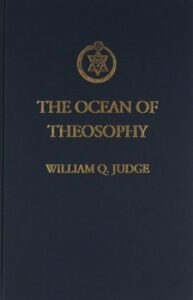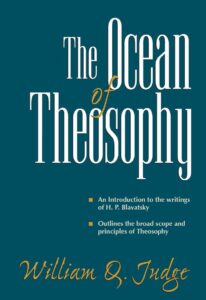Studies In The Ocean of Theosophy Part XX
Theosophy Magazine
Vol. 22, No. 8 June, 1934
pages 368 - 371
Part XX
SOME minds, rejecting the doctrine of Karma, find interest in Reincarnation from the purely romantic standpoint. To such the process rather than the philosophy appeals, their preference being to dream of who they may have been and what they may have enjoyed, instead of to search out the meaning of existence and the line of duty running through all lives. Many prevailing fantasies regarding the teaching spring from this type of adherent. One argument advanced is the “tiresomeness” of retracing issues no longer “living” — why should these come cropping up for adjustment! Another objection springs from mystification as to how acts forgotten by all concerned can be traced back to their origin and consequent reactions find their mark. “Who,” they ask, “is to discover beneficiary or culprit and direct results to the right person?”
Theosophy shows that there is no inward forgetting by either individuals or by Nature: when the cycle for fulfilment rolls around, all the witnesses connected with the event are sure to be on the scene. That called “forgetting” pertains solely to the personal man. Some things he puts out of his mind voluntarily; but many memories fade from his consciousness even though he would gladly retain them. Nevertheless, the true memory of each experience remains, indelibly inscribed on the Screen of Time, although in colors possibly quite different than the personality would think. The reason for this lies in the fact that “the whole system to which this globe belongs is alive, conscious on every plane, though only in man showing self-consciousness.” Upon this living universe all events leave their mark. The magnetic connection of these impressions with their producers makes it impossible for their force to be drawn elsewhere.
Materialism, separative, imbued with the idea of dead matter, and ignorant of the dynamics of human thought, has given rise to much misconception concerning the nature of action. Action, ordinarily regarded as physical, is really mental. For no “act is performed without a thought at its root either at the time of performance or as leading to it.” Proceeding from the metaphysical to the physical, it follows the general processes engaged in the formation of worlds: first desire arises; then comes specific ideation, followed by formulation of ways and means. The impulse thence transmitted to the physical organs of action is consummated objectively. Thus creative action is invisible, the so called action being but its effect.
This invisible action affects every minutest life in all the sheaths of the Thinker in its descent from mental conception to outward manifestation. The human Principles being specializations, or centres, of the substance of their planes, an effect on any one of them must radiate to the entire field to which it belongs. In this living, intelligent medium all such impressions are retained. The seven planes compose the Book of Life, of many pages, in which is recorded the history of Man.
The science of Physics states that for every force there is an equal force acting in the opposite direction. Theosophy teaches that this opposing force is but the original one completing its circuit back to the point of disturbance. Thus the disturber, the actor, receives reactions from all other beings. Some reactions are subtle and unnoted, as such, while others come bearing either pleasure or pain. Wise is he who discerns these both as the masks of Opportunity! Life thus acts on Life through lives, in the give and take of inherent Brotherhood. This reciprocity including all action whatsoever, there comes a time when a balance for any particular line of sequence is struck. Cause and effect equilibrated, action is nullified. But since thought is the plane of action, such compensation must be brought about by the mind, balanced by moral fitness. Not by fighting effects, but by learning the lessons involved, shall the necessity for Karmic retribution cease.
There is no conscious thought or will action below the Human kingdom, which fact establishes Man as adjuster for the lower kingdoms, as well as for himself — the responsible agent for all wrought on and through these lesser constituents of Nature. This inescapable charge extends from the earliest planetary beginnings, when choice was made with greater knowledge, and shall follow Humanity forward through all lives to come, until Karma is satisfied by the restoration of justice. Then only can evolution proceed normally and harmoniously. Mankind’s mysterious connection with Nature at large accounts for many a help and many a hindrance not received at human hands. Compensation comes by many and devious ways, for Mother Earth forgets not throughout her hidden realms: and neither does the Divine Witness within each personal man. His will being one with the Law, many an event, irksome or even tragic to His personal representative, may spell to Him the Path of peace and progress.
The man of flesh, prone to regard distasteful circumstances as rank imposition, holds forth eloquently upon the injustices of life, ever seeking avenues of escape in lieu of understanding. For most, perhaps, it may prove a long, long trail to conviction of the truth that all befalling is strictly “our own make.” If the brain hold no recollection of such fabrications, this does not militate against memory of them in some other department of the seven-fold constitution. Their registration in the physical brain is dependent upon its attunement to Egoic consciousness. These stored memories of the past influence the present of every man on earth. Lodged “in that part of man which we have called Manas,” the balanced accounts remain, marked “paid in full,” while actions not yet fully compensated exist there as living potencies, “subtle but powerful links with magnetic threads that enmesh the solar system, and through which various effects are brought out.”
“The marvellous modern experiments in hypnotism show that the slightest impression, no matter how far back in the history of the person, may be waked up to life, thus proving it is not lost but only latent.” Even so it is with the individual life, stretching back into the night of time; in its imperishable portion the whole story is preserved, including experiences and conditions presently undreamed, yet vividly real, the results and values of which follow from birth to birth, until cyclic Law permits tangible fruition. This explains, also, why we “may sometimes seem to receive effects solely from the acts of others,” but which are, in fact, “the results of our own acts and thoughts in this or some prior life. We perform our acts in company with others always, and the acts with their underlying thoughts have relation always to other persons and to ourselves.”
Cause and effect are but the two sides of action. The “effect is in the cause, and Karma produces the manifestation of it in the body, brain, and mind furnished by reincarnation. And as a cause set up by one man has a distinct relation to him as a centre from which it came,” its effect must return to that same centre — the accrued interest on the man’s original investment. Fortunate, indeed, is he who finds opportunity to pay up the principal. In a single lifetime, the Karmic precipitation may cover a great range, being, possibly, “pleasant in effect for one portion of our nature and unpleasant in another.” A “happy disposition, an excellent intellect, sound judgment, and every good moral quality” accompanied by physical affliction is easier to understand than is malice incarnate arrayed in beauteous flesh and possessed of keen mental powers to use for nefarious ends. “Whom the Gods love they chasten” is commonly quoted, in recognition of the salutary effects of suffering; but the prosperity of wicked men calls for philosophical integrity — full faith in that inherent justice which supplies what the Soul needs in favored vice as in afflicted virtue.
Each incoming Ego is both recipient and donor, receiving weal or woe at the hands of its parents and, as its life unfolds, bringing them the same — the harvests of prior sowings. Out of the vastnesses of the past come the light and shadow of human destiny, even as sunshine and cloud both issue from space. The teaching that “each man’s life the outcome of his former living is,” so that he may enjoy or suffer only that created by himself, supplies “an exactitude of justice which no other theory will furnish.” This is the Doctrine of Karma.
COMPILER’S NOTE: The following is a separate item which followed the above article but was on the same page. I felt it was useful to include it here:
“GOOD” AND “BAD” KARMA
Good Karma is that kind which the Ego desires and requires; bad, that which the Ego neither desires nor requires. And in this the Ego, being guided and controlled by law, by justice, by the necessities of upward evolution, and not by fancy or selfishness or revenge or ambition, is sure to choose the earthly habitation that is most likely … to give a Karma for the real advantage in the end … When we, from this plane, inquire into the matter, we see that the “advantages” which one would seek were he looking for the strengthening of character, the unloosing of soul force and energy, would be called by the selfish and personal world “disadvantages.” Struggle is needed for the gaining of strength; buffeting adverse eras is for the gaining of depth; meagre opportunities may be used for acquiring fortitude; poverty should breed generosity. The middle ground in all this, and not the extreme, is what we speak of.
Back to Ocean of Theosophy



